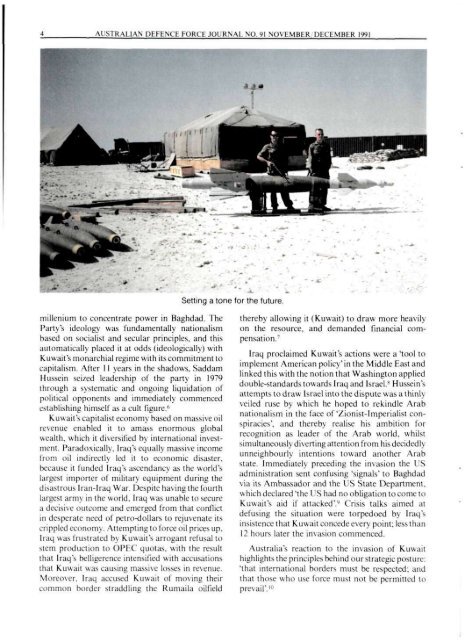ISSUE 91 : Nov/Dec - 1991 - Australian Defence Force Journal
ISSUE 91 : Nov/Dec - 1991 - Australian Defence Force Journal
ISSUE 91 : Nov/Dec - 1991 - Australian Defence Force Journal
Create successful ePaper yourself
Turn your PDF publications into a flip-book with our unique Google optimized e-Paper software.
4 AUSTRALIAN DEFENCE FORCE JOURNAL NO. <strong>91</strong> NOVEMBER DECEMBER 19<strong>91</strong><br />
Setting a tone for the future.<br />
millenium to concentrate power in Baghdad. The<br />
Party's ideology was fundamentally nationalism<br />
based on socialist and secular principles, and this<br />
automatically placed it at odds (ideologically) with<br />
Kuwait's monarchial regime with its commitment to<br />
capitalism. After 11 years in the shadows, Saddam<br />
Hussein seized leadership of the party in 1979<br />
through a systematic and ongoing liquidation of<br />
political opponents and immediately commenced<br />
establishing himself as a cult figure. 6<br />
Kuwait's capitalist economy based on massive oil<br />
revenue enabled it to amass enormous global<br />
wealth, which it diversified by international investment.<br />
Paradoxically. Iraq's equally massive income<br />
from oil indirectly led it to economic disaster,<br />
because it funded Iraq's ascendancy as the world's<br />
largest importer of military equipment during the<br />
disastrous Iran-Iraq War. Despite having the fourth<br />
largest army in the world, Iraq was unable to secure<br />
a decisive outcome and emerged from that conflict<br />
in desperate need of petro-dollars to rejuvenate its<br />
crippled economy. Attempting to force oil prices up,<br />
Iraq was frustrated by Kuwait's arrogant refusal to<br />
stem production to OPEC quotas, with the result<br />
that Iraq's belligerence intensified with accusations<br />
that Kuwait was causing massive losses in revenue.<br />
Moreover, Iraq accused Kuwait of moving their<br />
common border straddling the Rumaila oilfield<br />
thereby allowing it (Kuwait) to draw more heavily<br />
on the resource, and demanded financial compensation.<br />
7<br />
Iraq proclaimed Kuwait's actions were a 'tool to<br />
implement American policy'in the Middle East and<br />
linked this with the notion that Washington applied<br />
double-standards towards Iraq and Israel.* Hussein's<br />
attempts to draw Israel into the dispute was a thinly<br />
veiled ruse by which he hoped to rekindle Arab<br />
nationalism in the face of'Zionist-Imperialist conspiracies',<br />
and thereby realise his ambition for<br />
recognition as leader of the Arab world, whilst<br />
simultaneously diverting attention from his decidedly<br />
unneighbourly intentions toward another Arab<br />
state. Immediately preceding the invasion the US<br />
administration sent confusing 'signals' to Baghdad<br />
via its Ambassador and the US State Department,<br />
w hich declared 'the US had no obligation to come to<br />
Kuwait's aid if attacked'. 9 Crisis talks aimed at<br />
defusing the situation were torpedoed by Iraq's<br />
insistence that Kuwait concede every point: less than<br />
12 hours later the invasion commenced.<br />
Australia's reaction to the invasion of Kuwait<br />
highlights the principles behind our strategic posture:<br />
'that international borders must be respected: and<br />
that those who use force must not be permitted to<br />
prevail'. 10

















